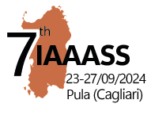
The Organizing Committee welcomes you to Polaris Technology Park, located in the territory of Pula (Cagliari) in a natural park at the foot of Sulcis mountains, South-Western coast of Sardinia. We look forward to sharing with you a wider view on current and future antiviral strategies in this amazing place!
Organizers of the 7th IAAASS 2024: scientific curricula & career path
Enzo Tramontano (Cagliari, Italy)
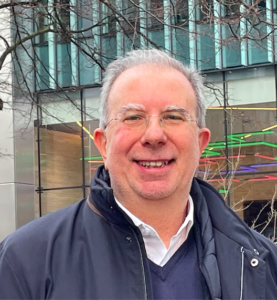 ENZO TRAMONTANO is full professor of Microbiology and Chair of the Department of Life and Environmental Sciences at the University of Cagliari, Italy. He holds a degree (1990) from the University of Cagliari (Italy), and has been Visiting Research Scientist at the Department of Pharmacology at Yale University Medical School (CT, USA, 1990-1992 and 1996-1998). Since 1998 he is at the University of Cagliari where he also served as Director of the PhD program in Life, Environmental and Drug Sciences (2013-2019) and Dean of the Faculty of Biology and Pharmacy (2015-2021). Since 2022 he is Vice-President of the Italian Society for Virology (SIV-ISV). He is Associated Editor of Viruses and editor for several journals. From 2006 he is head of the Molecular Virology center of the Department of Life and Environmental Sciences of the University of Cagliari. His research activities mostly focused on the development of antiviral drugs and the study of endogenous retroviriuses and he supervised 12 PhD students. Particularly, he published > 180 papers related to i) antiviral drug discovery using both biochemical and cell-based techniques to evaluate the ability of small molecules to block the enzymatic function of viral enzymes and to inhibit viral replication; ii) identification and characterization of retroviral sequences stably integrated into human genomes and definition of their transcriptome to explore their physiological and pathological role; iii) understanding the viral impact on the host cell and in particular on the pathways involved in the innate immunity viral evasion also to exploit these molecular determinants as drug targets.
ENZO TRAMONTANO is full professor of Microbiology and Chair of the Department of Life and Environmental Sciences at the University of Cagliari, Italy. He holds a degree (1990) from the University of Cagliari (Italy), and has been Visiting Research Scientist at the Department of Pharmacology at Yale University Medical School (CT, USA, 1990-1992 and 1996-1998). Since 1998 he is at the University of Cagliari where he also served as Director of the PhD program in Life, Environmental and Drug Sciences (2013-2019) and Dean of the Faculty of Biology and Pharmacy (2015-2021). Since 2022 he is Vice-President of the Italian Society for Virology (SIV-ISV). He is Associated Editor of Viruses and editor for several journals. From 2006 he is head of the Molecular Virology center of the Department of Life and Environmental Sciences of the University of Cagliari. His research activities mostly focused on the development of antiviral drugs and the study of endogenous retroviriuses and he supervised 12 PhD students. Particularly, he published > 180 papers related to i) antiviral drug discovery using both biochemical and cell-based techniques to evaluate the ability of small molecules to block the enzymatic function of viral enzymes and to inhibit viral replication; ii) identification and characterization of retroviral sequences stably integrated into human genomes and definition of their transcriptome to explore their physiological and pathological role; iii) understanding the viral impact on the host cell and in particular on the pathways involved in the innate immunity viral evasion also to exploit these molecular determinants as drug targets.
Reuben Harris (San Antonio, TX – USA)
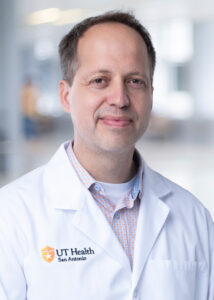 REUBEN HARRIS is an investigator of the Howard Hughes Medical Institute (HHMI) and chair of the Biochemistry and Structural Biology department at the University of Texas Health San Antonio. He received his B.S. (1993) and Ph.D. (1997) degrees from the University of Alberta and performed postdoctoral work at Baylor College of Medicine (1997-1998), Yale University (1998), and Cambridge University (1998-2003). He joined the University of Minnesota as an Assistant Professor in 2003 and was promoted to Associate Professor with Tenure in 2008 and to Full Professor in 2013. In 2022, Dr. Harris moved his laboratory to the University of Texas Health San Antonio. Dr Harris has received numerous grants and awards, including a Searle Scholarship, American Academy of Microbiology membership, NIH Merit Award, a Distinguished McKnight University Professorship, and the KT Jeang Prize. In 2015, he was also appointed as a Howard Hughes Medical Institute Investigator. Dr. Harris is an Associate Editor for Science Advances and an Editorial Board Member for the Journal of Biological Chemistry, Journal of Virology, and Cancer Research. He has published over 200 manuscripts, contributed to 13 patent applications, and co-founded a cancer therapeutics company. Dr. Harris’s scientific passion is elucidating mechanisms of mutation and establishing relevance to human biology and disease. As a doctoral student, he discovered a novel recombination-dependent mutation process operative in stationary-phase bacteria with implications for antibiotic resistance and microbial evolution. As a postdoctoral fellow, he helped solve an immunology Rosetta stone by discovering the DNA cytosine deaminase activity of AID and proposing a DNA deamination model for antibody gene diversification. Also as a postdoctoral fellow, he discovered the DNA cytosine deaminase activity of several APOBEC family members and, during the transition to faculty, elucidated a new mechanism of antiviral immunity by demonstrating APOBEC3G-catalyzed retroviral cDNA hypermutation. As a Principal Investigator, Dr. Harris has become known for his work on APOBEC enzymes in antiviral immunity. This body of work has shed light on fundamental mechanisms of antiviral immunity and yielded new strategies for drug development. In recent years, Dr. Harris’s virology studies have also enabled a major breakthrough in cancer research. His group found that APOBEC3 enzymes are responsible for a large proportion of mutations in breast, head/neck, lung, bladder, cervical, and other cancers. Independent work has confirmed these results and indicated that “APOBEC mutagenesis” far exceeds most other sources of mutations in cancer, including those attributable to smoking and UV rays. These breakthroughs have created new opportunities for cancer diagnosis, prognosis, and treatment by targeting tumor evolvability. One of his other passions is training and mentoring the next-generation of scientists, and he has trained a multitude of students and postdoctoral fellows over his career. Importantly, all of these trainees have succeeded in obtaining independent positions in academia or industry.
REUBEN HARRIS is an investigator of the Howard Hughes Medical Institute (HHMI) and chair of the Biochemistry and Structural Biology department at the University of Texas Health San Antonio. He received his B.S. (1993) and Ph.D. (1997) degrees from the University of Alberta and performed postdoctoral work at Baylor College of Medicine (1997-1998), Yale University (1998), and Cambridge University (1998-2003). He joined the University of Minnesota as an Assistant Professor in 2003 and was promoted to Associate Professor with Tenure in 2008 and to Full Professor in 2013. In 2022, Dr. Harris moved his laboratory to the University of Texas Health San Antonio. Dr Harris has received numerous grants and awards, including a Searle Scholarship, American Academy of Microbiology membership, NIH Merit Award, a Distinguished McKnight University Professorship, and the KT Jeang Prize. In 2015, he was also appointed as a Howard Hughes Medical Institute Investigator. Dr. Harris is an Associate Editor for Science Advances and an Editorial Board Member for the Journal of Biological Chemistry, Journal of Virology, and Cancer Research. He has published over 200 manuscripts, contributed to 13 patent applications, and co-founded a cancer therapeutics company. Dr. Harris’s scientific passion is elucidating mechanisms of mutation and establishing relevance to human biology and disease. As a doctoral student, he discovered a novel recombination-dependent mutation process operative in stationary-phase bacteria with implications for antibiotic resistance and microbial evolution. As a postdoctoral fellow, he helped solve an immunology Rosetta stone by discovering the DNA cytosine deaminase activity of AID and proposing a DNA deamination model for antibody gene diversification. Also as a postdoctoral fellow, he discovered the DNA cytosine deaminase activity of several APOBEC family members and, during the transition to faculty, elucidated a new mechanism of antiviral immunity by demonstrating APOBEC3G-catalyzed retroviral cDNA hypermutation. As a Principal Investigator, Dr. Harris has become known for his work on APOBEC enzymes in antiviral immunity. This body of work has shed light on fundamental mechanisms of antiviral immunity and yielded new strategies for drug development. In recent years, Dr. Harris’s virology studies have also enabled a major breakthrough in cancer research. His group found that APOBEC3 enzymes are responsible for a large proportion of mutations in breast, head/neck, lung, bladder, cervical, and other cancers. Independent work has confirmed these results and indicated that “APOBEC mutagenesis” far exceeds most other sources of mutations in cancer, including those attributable to smoking and UV rays. These breakthroughs have created new opportunities for cancer diagnosis, prognosis, and treatment by targeting tumor evolvability. One of his other passions is training and mentoring the next-generation of scientists, and he has trained a multitude of students and postdoctoral fellows over his career. Importantly, all of these trainees have succeeded in obtaining independent positions in academia or industry.
Graciela Andrei (Leuven, Belgium)
GRACIELA ANDREI holds a PhD in Biological Sciences and is an Assistant Professor at the Faculty of Medicine, Katholieke Universiteit Leuven, Belgium. At the Rega Institute for Medical Research, Department of Microbiology and Immunology, she carries out her research work that is mainly focused on chemotherapy of viral diseases, with emphasis on herpesviruses (cytomegalovirus, varicella-zoster virus and herpes simplex), poxviruses (vaccinia, cowpox, orf), polyomaviruses and papillomaviruses, and the study of the molecular mechanisms underlying the antiviral drug resistance phenomenon and anticancer activity of nucleotide analogues. Dr. G. Andrei has authored approximately 30 and co-authored approximately 260 papers in international peer-reviewed journals between 1983 and 2011. She has also (co)authored 6 book chapters and 10 proceedings articles and about 260 published abstracts between 1983 and 2011.
Ben Berkhout (Amsterdam, The Netherlands)

BEN BERKHOUT studied molecular biology at Leiden University and obtained his PhD in 1986 on translational control by means of RNA structure in bacteriophages. He performed postdoctoral research at the Dana Farber Cancer Institute (Harvard Medical School) and the National Institutes of Health (USA). He became Head of the Laboratory of Experimental Virology and was appointed Professor of Human Retrovirology at the University of Amsterdam in 2002. BB is editor-in-chief of Virus Research and editor for several journals. He supervised 49 PhD students and published over 580 manuscripts on HIV-1 replication, virus evolution, virus discovery and new antiviral therapeutic strategies.
Francesca Caboi (Cagliari, Italy)
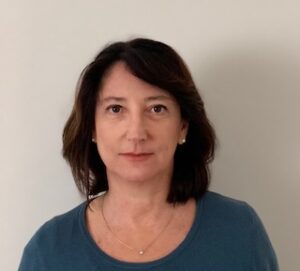
Francesca Caboi graduated in Chemistry at the University of Cagliari in 1992. She spent a year as a scholarship holder at the neurochemistry department of Synthélabo Recherche (Sanofi Aventis) in Bagneux (Paris-France). In 1997 she obtained a PhD in Chemical Sciences from the University of Cagliari. She worked as a researcher at the University of Cagliari and as a visiting researcher at the Department of Physical Chemistry 1, University of Lund (Sweden) up to 2004. Her research focused on biocompatible colloidal drug delivery systems and their physicochemical characterization. From 2004 to 2010, she worked as Head of the Analytical Department in the preclinical development of therapeutic proteins at Bio-Ker srl, a biotechnology company located in the Science and Technology Park of Sardinia in Pula. Subsequently, she was responsible for regulatory affairs at Fase 1 srl, a company owned by the Region of Sardinia involved in pre-clinical and clinical drug.
She is currently Technical and Scientific Manager at Sardegna Ricerche, agency of the Region of Sardinia.
Angela Corona (Cagliari – Italy)
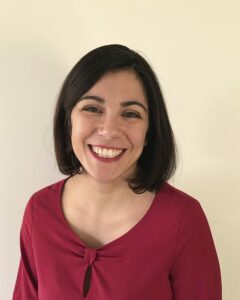 ANGELA CORONA is an Associated Professor of Microbiology at the University of Cagliari. She graduated in Pharmaceutical Chemistry at the University of Cagliari in 2010 and earned in 2014 a PhD in Biology and Biochemistry. She was Guest Researcher in 2011/2012 at the Drug Resistance Program, Center for Excellence in HIV / AIDS and Cancer Virology, Center for Cancer Research at the National Cancer Institute, MD, USA and in 2013 at the Laboratoire de Biologie et Pharmacologie appliquée, Ecole Normale Superieure de Cachan, Paris. Since 2015 she has been a post-doctoral researcher at the Molecular Virology Laboratory of the Department of Life and Environmental Sciences at the University of Cagliari. In 2017 she was Research Fellow at the IrsiCaixaAIDS Research Institute, Hospital Germans Trias and Pujol, Barcelona, granted by Chu Family Foundation (CFF) Women Scientists Award. Since 2020 she was Assistant Professor at the Faculty of Biology and Pharmacy, Department of Life and Environmental Sciences, Section of Molecular Virology, University of Cagliari (Italy). Angela is a molecular virologist whose research activity has different topics related to the identification and characterization of the mechanism of action of antiviral molecules with different targets: she started her antiviral research activity working on the ribonuclease-H function associated with the HIV-1 reverse transcriptase. She also investigates the pathological roles of viral proteins to validate novel targets for drug development. In particular, she focused on Ebola virus proteins involved in the inhibition of innate immune response (VP35 and VP24 proteins). Her expertise in biochemical assays is coupled with expertise in the evaluation of antiviral activity in cell-based assays for Class 2 and Class 3 viral agents. Recently she has been involved in several grants regarding Coronaviruses, as in the EU-granted project EXSCALATE4CoV (E4C), a 2020 tender for projects to counter the Coronavirus pandemic and improve the management and care of patients (https://www.exscalate4cov.eu/). For her research activities, she was awarded the “Cecilia Cioffrese- Malattie Virali 2016” prize by the Carlo Erba Foundation. Her work has resulted in 95 publications including papers and book chapters. She is part of the editorial board of Frontiers as Review Editor in Experimental Pharmacology and Drug Discovery and in Antivirals and Vaccines.
ANGELA CORONA is an Associated Professor of Microbiology at the University of Cagliari. She graduated in Pharmaceutical Chemistry at the University of Cagliari in 2010 and earned in 2014 a PhD in Biology and Biochemistry. She was Guest Researcher in 2011/2012 at the Drug Resistance Program, Center for Excellence in HIV / AIDS and Cancer Virology, Center for Cancer Research at the National Cancer Institute, MD, USA and in 2013 at the Laboratoire de Biologie et Pharmacologie appliquée, Ecole Normale Superieure de Cachan, Paris. Since 2015 she has been a post-doctoral researcher at the Molecular Virology Laboratory of the Department of Life and Environmental Sciences at the University of Cagliari. In 2017 she was Research Fellow at the IrsiCaixaAIDS Research Institute, Hospital Germans Trias and Pujol, Barcelona, granted by Chu Family Foundation (CFF) Women Scientists Award. Since 2020 she was Assistant Professor at the Faculty of Biology and Pharmacy, Department of Life and Environmental Sciences, Section of Molecular Virology, University of Cagliari (Italy). Angela is a molecular virologist whose research activity has different topics related to the identification and characterization of the mechanism of action of antiviral molecules with different targets: she started her antiviral research activity working on the ribonuclease-H function associated with the HIV-1 reverse transcriptase. She also investigates the pathological roles of viral proteins to validate novel targets for drug development. In particular, she focused on Ebola virus proteins involved in the inhibition of innate immune response (VP35 and VP24 proteins). Her expertise in biochemical assays is coupled with expertise in the evaluation of antiviral activity in cell-based assays for Class 2 and Class 3 viral agents. Recently she has been involved in several grants regarding Coronaviruses, as in the EU-granted project EXSCALATE4CoV (E4C), a 2020 tender for projects to counter the Coronavirus pandemic and improve the management and care of patients (https://www.exscalate4cov.eu/). For her research activities, she was awarded the “Cecilia Cioffrese- Malattie Virali 2016” prize by the Carlo Erba Foundation. Her work has resulted in 95 publications including papers and book chapters. She is part of the editorial board of Frontiers as Review Editor in Experimental Pharmacology and Drug Discovery and in Antivirals and Vaccines.
Stuart Le Grice
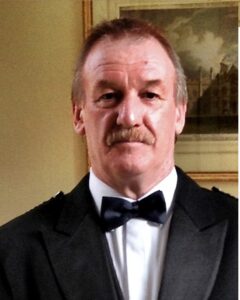 STUART LE GRICE received his Ph.D. from the Department of Biochemistry, University of Manchester, UK, in 1976, where he studied the mechanisms of R-factor-mediated multidrug resistance in Escherichia coli. After postdoctoral training in the United Kingdom, Germany, and the United States, he was appointed Senior Scientist in the Central Research Units of Hoffmann La Roche, Basel, Switzerland, where he worked from 1984 to 1990 evaluating HIV-1 and HIV-2 enzymes as therapeutic targets. In 1990, he joined the faculty in the Division of Infectious Diseases, Department of Medicine, Case Western Reserve University (CWRU), Cleveland, OH. Initially recruited as an Associate Professor of Medicine, he was awarded tenure in 1992, and in 1995 was promoted to Professor of Medicine, Biochemistry, and Oncology. From 1994 to 1999, he served as Director of the NIH-funded CWRU Center for AIDS Research. Dr. Le Grice joined the National Cancer Institute in 1999 as Chief of the Resistance Mechanisms Laboratory in the HIV Drug Resistance Program, Center for Cancer Research (CCR), and in 2005 was appointed to the Senior Biomedical Research Service. In 2006, he was appointed Head of the Center of Excellence in HIV/AIDS & Cancer Virology, CCR. He is now head of the Basic Research Laboratory at the Center for Cancer Research of the National Cancer Institute. He is a member of the CCR HIV and Cancer Virology faculty, Chemistry and Biology faculty, and the Steering Committee of the Molecular Targets Discovery Program. In addition to serving on the Editorial Board of the Journal of Biological Chemistry, Dr. Le Grice has been an ad hoc (1990-1999) and permanent Study Section member of NIH AIDS review panels (2000-2004), as well as an ad hoc reviewer for several international funding agencies.
STUART LE GRICE received his Ph.D. from the Department of Biochemistry, University of Manchester, UK, in 1976, where he studied the mechanisms of R-factor-mediated multidrug resistance in Escherichia coli. After postdoctoral training in the United Kingdom, Germany, and the United States, he was appointed Senior Scientist in the Central Research Units of Hoffmann La Roche, Basel, Switzerland, where he worked from 1984 to 1990 evaluating HIV-1 and HIV-2 enzymes as therapeutic targets. In 1990, he joined the faculty in the Division of Infectious Diseases, Department of Medicine, Case Western Reserve University (CWRU), Cleveland, OH. Initially recruited as an Associate Professor of Medicine, he was awarded tenure in 1992, and in 1995 was promoted to Professor of Medicine, Biochemistry, and Oncology. From 1994 to 1999, he served as Director of the NIH-funded CWRU Center for AIDS Research. Dr. Le Grice joined the National Cancer Institute in 1999 as Chief of the Resistance Mechanisms Laboratory in the HIV Drug Resistance Program, Center for Cancer Research (CCR), and in 2005 was appointed to the Senior Biomedical Research Service. In 2006, he was appointed Head of the Center of Excellence in HIV/AIDS & Cancer Virology, CCR. He is now head of the Basic Research Laboratory at the Center for Cancer Research of the National Cancer Institute. He is a member of the CCR HIV and Cancer Virology faculty, Chemistry and Biology faculty, and the Steering Committee of the Molecular Targets Discovery Program. In addition to serving on the Editorial Board of the Journal of Biological Chemistry, Dr. Le Grice has been an ad hoc (1990-1999) and permanent Study Section member of NIH AIDS review panels (2000-2004), as well as an ad hoc reviewer for several international funding agencies.
Johan Neyts (Leuven, Belgium)
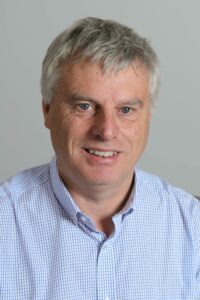 JOHAN NEYTS is full professor of Virology at the University of Leuven (KU Leuven), Belgium where he teaches virology at the medical school and at the school of dentistry. His laboratory www.antivirals.be has a long-standing expertise in the development of antivirals strategies and drugs against emerging and neglected viral infections such as dengue and other flaviviruses, Chikungunya and other alphaviruses, enteroviruses, noroviruses, HDV, HEV, rabies and coronaviruses. An ultrapotent pan-serotype dengue inhibitor developed in his laboratory and at the Centre for Drug Design & Development (www.cd3.be) is currently in phase II clinical studies at Janssen Pharmaceutica (J&J) and efficacy has recently been shown in dengue infected humans. A second focus is on the development of the PLLAV (Plasmid Launched Live Attenuated Virus) vaccine technology, which is based on the yellow fever virus vaccine as a vector. It allows to rapidly engineer highly thermostable vaccines against multiple viral pathogens. Johan is a past-president of the International Society for Antiviral Research. He is the co-founder of KU Leuven spin-off companies AstriVax www.astrivax.com and Okapi Sciences. He is responsible for the Belgian VirusBank platform www.virusbankplatform.be an investment of the Belgian Federal Government in epidemic/pandemic preparedness. He published >660 papers, received multiple national and international awards, has given ~350 invited lectures and a large number of interviews to lay-press.
JOHAN NEYTS is full professor of Virology at the University of Leuven (KU Leuven), Belgium where he teaches virology at the medical school and at the school of dentistry. His laboratory www.antivirals.be has a long-standing expertise in the development of antivirals strategies and drugs against emerging and neglected viral infections such as dengue and other flaviviruses, Chikungunya and other alphaviruses, enteroviruses, noroviruses, HDV, HEV, rabies and coronaviruses. An ultrapotent pan-serotype dengue inhibitor developed in his laboratory and at the Centre for Drug Design & Development (www.cd3.be) is currently in phase II clinical studies at Janssen Pharmaceutica (J&J) and efficacy has recently been shown in dengue infected humans. A second focus is on the development of the PLLAV (Plasmid Launched Live Attenuated Virus) vaccine technology, which is based on the yellow fever virus vaccine as a vector. It allows to rapidly engineer highly thermostable vaccines against multiple viral pathogens. Johan is a past-president of the International Society for Antiviral Research. He is the co-founder of KU Leuven spin-off companies AstriVax www.astrivax.com and Okapi Sciences. He is responsible for the Belgian VirusBank platform www.virusbankplatform.be an investment of the Belgian Federal Government in epidemic/pandemic preparedness. He published >660 papers, received multiple national and international awards, has given ~350 invited lectures and a large number of interviews to lay-press.
Elias Maccioni (Cagliari, Italy)
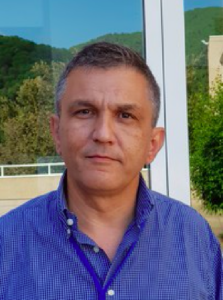 ELIAS MACCIONI (1966) holds a degree from the University of Cagliari, Italy, (1990) and was appointed Assistant Professor of medicinal chemistry in 1992. In 1993 to 1994 he was Visiting Researcher at the Department of Chemistry of the University of Bangor, North Wales. In 2005 he was appointed Associate Professor of Medicinal Chemistry at the Faculty of Pharmacy of the University of Cagliari. He now leads a research group of Drug Discovery at the Department of Life and Environmental Sciences of the University of Cagliari. He is member of the Italian society of Medicinal Chemistry . Moreover he is coordinator of the Paul Ehrlich Network of European Medicinal Chemistry PhD for the University of Cagliari. His research is mainly directed towards the design and synthesis of HIV 1 reverse transcriptase and human monoamine oxidase inhibitors.
ELIAS MACCIONI (1966) holds a degree from the University of Cagliari, Italy, (1990) and was appointed Assistant Professor of medicinal chemistry in 1992. In 1993 to 1994 he was Visiting Researcher at the Department of Chemistry of the University of Bangor, North Wales. In 2005 he was appointed Associate Professor of Medicinal Chemistry at the Faculty of Pharmacy of the University of Cagliari. He now leads a research group of Drug Discovery at the Department of Life and Environmental Sciences of the University of Cagliari. He is member of the Italian society of Medicinal Chemistry . Moreover he is coordinator of the Paul Ehrlich Network of European Medicinal Chemistry PhD for the University of Cagliari. His research is mainly directed towards the design and synthesis of HIV 1 reverse transcriptase and human monoamine oxidase inhibitors.
Kathie Seley-Radtke (Baltimore, MD – USA)
 KATHERINE SELEY-RADTKE is a Professor in the Department of Chemistry & Biochemistry at the University of Maryland, Baltimore County. Her medicinal chemistry research focuses on targeting coronaviruses, filoviruses, flaviviruses among other infectious diseases, using her novel “fleximer” nucleoside/tide scaffolds. Prof. Seley-Radtke is currently the President of the International Society for Antiviral Research (ISAR), as well as a past President and current Secretary for the International Society for Nucleosides, Nucleotides & Nucleic Acids (IS3NA). She also chaired of the 2023 Gordon Research Conference on Nucleosides, Nucleotides & Oligonucleotides. Prof. Seley-Radtke also serves as Editor in Chief of Annual Reports in Medicinal Chemistry, and as Associate Editor of Science Advances/AAAS. Some of her other service contributions include her continuing role as one of the U.S. National Academies of Science’s Jefferson Science Fellows with the U.S. Dept. of State and the U.S. Embassy in Moscow, Russia. For the past 22 years, Kathie has served on numerous NIH and other funding agency review panels, including as Chair/Alternate Chair. Most notably, Kathie has been heavily involved in mentoring junior colleagues, and as part of this, when she was President of IS3NA, she initiated the Chu Family Foundation Fellowships for Early Career Women for both IS3NA and ISAR, and she continues to Chair that important committee for both Societies. She has published over 100 papers and book chapters, has 27 patents, given over 170 invited and plenary lectures world-wide, and has received many honors including the American Chemical Society’s Chemist of the Year in 2016, the University of Maryland System’s Regents’ Faculty Award for Excellence in Research in 2017, the 2015-2018 UMBC Presidential Research Professor, as well as one of the Baltimore Sun’s 25 Women to Watch. More recently she was selected as Kathie was awarded the 2020 ISAR Antonín Holy Memorial Award for her outstanding accomplishments and demonstrated service to the antiviral and medicinal chemistry field. The Holy award is the Society’s top honor for chemists.
KATHERINE SELEY-RADTKE is a Professor in the Department of Chemistry & Biochemistry at the University of Maryland, Baltimore County. Her medicinal chemistry research focuses on targeting coronaviruses, filoviruses, flaviviruses among other infectious diseases, using her novel “fleximer” nucleoside/tide scaffolds. Prof. Seley-Radtke is currently the President of the International Society for Antiviral Research (ISAR), as well as a past President and current Secretary for the International Society for Nucleosides, Nucleotides & Nucleic Acids (IS3NA). She also chaired of the 2023 Gordon Research Conference on Nucleosides, Nucleotides & Oligonucleotides. Prof. Seley-Radtke also serves as Editor in Chief of Annual Reports in Medicinal Chemistry, and as Associate Editor of Science Advances/AAAS. Some of her other service contributions include her continuing role as one of the U.S. National Academies of Science’s Jefferson Science Fellows with the U.S. Dept. of State and the U.S. Embassy in Moscow, Russia. For the past 22 years, Kathie has served on numerous NIH and other funding agency review panels, including as Chair/Alternate Chair. Most notably, Kathie has been heavily involved in mentoring junior colleagues, and as part of this, when she was President of IS3NA, she initiated the Chu Family Foundation Fellowships for Early Career Women for both IS3NA and ISAR, and she continues to Chair that important committee for both Societies. She has published over 100 papers and book chapters, has 27 patents, given over 170 invited and plenary lectures world-wide, and has received many honors including the American Chemical Society’s Chemist of the Year in 2016, the University of Maryland System’s Regents’ Faculty Award for Excellence in Research in 2017, the 2015-2018 UMBC Presidential Research Professor, as well as one of the Baltimore Sun’s 25 Women to Watch. More recently she was selected as Kathie was awarded the 2020 ISAR Antonín Holy Memorial Award for her outstanding accomplishments and demonstrated service to the antiviral and medicinal chemistry field. The Holy award is the Society’s top honor for chemists.
Vincenzo Summa (Naples, Italy)
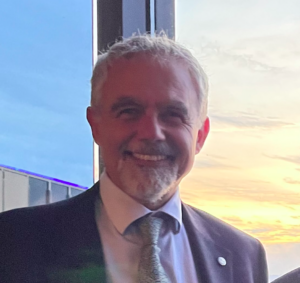 VINCENZO SUMMA is a full professor of Medicinal Chemistry in department of Pharmacy at Federico II University, Naples, since May 2019. He is one of the founders in 2009 of IRBM spa a research center formally a spin-off of the Merck Research Laboratories located in Rome. He also served as Vice-president, Drug Discovery of IRBM spa. Vincenzo is graduated in Industrial Chemistry at the University of Rome ‘La Sapienza’ in 1991 and in 1997 obtained his Ph.D. in Organic Chemistry at Bergische Universität Wuppertal. From 1992 to 1994 was also a fellow at the University of Rome “La Sapienza”. In 1996 he started his industrial carrier at Merck Research Laboratory in Rome at the Medicinal Chemistry Department. He gained increasing scientific and managerial responsibility becoming Director in the Med. Chem. department. He led several projects mainly in antiviral drug discovery and development fields bringing successfully several compounds into the clinical development. Vincenzo’s most relevant scientific contributions are the discovery of two antiviral drugs, Raltegravir (Isentress), the First in Class HIV integrase inhibitor approved and Grazoprevir the Best in Class HCV protease inhibitors. He received important awards for the discovery of these two very important drugs. He was appointed twice Heroes of Chemistry from the American Chemical Society for the discovery, Raltegravir ( ISENTRESS®) the first in class HIV int. inh. in 2013 and , in 2017 for the discovery of Grazoprevir-ZAPATIER® the Best in class HCV protease inhibitor. He received the Holì Memorial Award by the International Society for Antiviral Research in 2023. The most recent award is the Medaglia Giacomello for the Division of Medicinal Chemistry of the Italian Chemistry Society in August 2024. The current main research areas are in antivirals, epigenetic modulators, neglect and rare diseases.
VINCENZO SUMMA is a full professor of Medicinal Chemistry in department of Pharmacy at Federico II University, Naples, since May 2019. He is one of the founders in 2009 of IRBM spa a research center formally a spin-off of the Merck Research Laboratories located in Rome. He also served as Vice-president, Drug Discovery of IRBM spa. Vincenzo is graduated in Industrial Chemistry at the University of Rome ‘La Sapienza’ in 1991 and in 1997 obtained his Ph.D. in Organic Chemistry at Bergische Universität Wuppertal. From 1992 to 1994 was also a fellow at the University of Rome “La Sapienza”. In 1996 he started his industrial carrier at Merck Research Laboratory in Rome at the Medicinal Chemistry Department. He gained increasing scientific and managerial responsibility becoming Director in the Med. Chem. department. He led several projects mainly in antiviral drug discovery and development fields bringing successfully several compounds into the clinical development. Vincenzo’s most relevant scientific contributions are the discovery of two antiviral drugs, Raltegravir (Isentress), the First in Class HIV integrase inhibitor approved and Grazoprevir the Best in Class HCV protease inhibitors. He received important awards for the discovery of these two very important drugs. He was appointed twice Heroes of Chemistry from the American Chemical Society for the discovery, Raltegravir ( ISENTRESS®) the first in class HIV int. inh. in 2013 and , in 2017 for the discovery of Grazoprevir-ZAPATIER® the Best in class HCV protease inhibitor. He received the Holì Memorial Award by the International Society for Antiviral Research in 2023. The most recent award is the Medaglia Giacomello for the Division of Medicinal Chemistry of the Italian Chemistry Society in August 2024. The current main research areas are in antivirals, epigenetic modulators, neglect and rare diseases.
7th IAAASS 2024 Secretariat
Francesca Esposito
Nicole Grandi
Antonio Lupia
Rita Meleddu
Carla Piras
email: iaaass@unica.it
